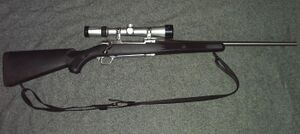Engineering:Ruger M77
| Ruger M77 | |
|---|---|
 Ruger M77 MK II .270 WIN | |
| Type | Rifle |
| Place of origin | United States |
| Production history | |
| Designer | L. James Sullivan |
| Designed | 1968 |
| Manufacturer | Sturm, Ruger & Co.[1] |
| Variants | See Variants |
| Specifications (Ruger M77 Standard) | |
| Mass | 6.75–8.25 pounds (3.06–3.74 kg)[2] |
| Length | 42–44.75 inches (106.7–113.7 cm)[2] |
| Barrel length | 22–24 inches (56–61 cm)[2] |
| Cartridge | .223 Remington
.220 Swift .22-250 Remington .243 Winchester .25-06 Remington .257 Roberts .264 Winchester Magnum .270 Winchester .284 Winchester .280 Remington .30-06 Springfield .308 Winchester .300 Winchester Magnum 7x57 Mauser .338 Federal .338 Ruger Compact Magnum .338 Winchester Magnum .350 Remington Magnum 7.62x39mm .357 S&W Magnum .44 Remington Magnum |
| Calibre | Various |
| Barrels | Various |
| Action | Bolt action |
| Feed system | 3-5 round integral box magazine[2] |
| 30.06 Cal SAR (Search and Rescue) Rifle | |
|---|---|
| Type | Rifle |
| Place of origin | Canada |
| Production history | |
| Manufacturer | Diemaco |
| Specifications | |
| Mass | 3.2 kg (7.05 lbs) unloaded 3.34 kg (7.37 lbs) loaded, extra rounds in butt |
| Length | 88.9 cm (35 inches) unfolded 64.44 cm (25.37 inches) folded |
| Barrel length | 36.83 cm (14.5 inches) |
| Cartridge | .30-06 Springfield |
| Cartridge weight | 180 gr |
| Action | Bolt Action |
| Muzzle velocity | 823 m/s (2,700 ft/s) |
| Feed system | 5 rounds, Integral box magazine |
The Ruger M77 is a bolt-action rifle produced by Sturm, Ruger & Company. It was designed by Jim Sullivan during his three years with Ruger. The rifle features a traditional Mauser-style two-lugged bolt with a claw extractor.
Design and features
From the beginning, the Ruger M77 was intended as a modernized Mauser 98, though numerous changes were made. Bill Ruger wanted to use investment casting in place of a forged receiver. The Sullivan-designed bolt dispensed with the Mauser blade type ejector and instead used the simpler plunger style of ejector. A two-position tang safety and redesigned trigger system were also designed from scratch.
Perhaps the most novel feature of the M77 is the only one that has not been redesigned, the angled action screw. The front action screw of traditional bolt-action rifles draws the receiver directly down against the stock. The M77 uses an angled screw that draws the action down and to the rear, tightly bedding it against the stock.
Variants
The M77 has undergone one minor and two major redesigns. The first change involved incorporating a proprietary scope mount milled integral with the receiver. The first rifles had simple rounded-top receivers drilled and tapped for separate scope mounts.
M77 Mark II
The M77 was retooled almost entirely and reintroduced in 1991 as the Mark II. The safety, bolt, and trigger were completely redesigned. The claw extractor was retained, but the bolt face was opened up to allow controlled-round feeding. The plunger ejector was replaced with a Mauser style blade ejector. Finally, a three-position safety allowed the bolt to be operated while the gun was still on safe, making unloading of the rifle less hazardous. Ruger also eliminated the adjustable trigger that came stock on the original M77.
Hawkeye
In 2006, Ruger introduced new features and a new name for their rifle, the Hawkeye. Major changes were made to the trigger system and the stock was recontoured, but otherwise the rifle remained unchanged.[1] The LC6 trigger addressed complaints from consumers about the Mark II trigger to make it safer than the earlier design.[2][3] The LC6 trigger is lighter and smoother.
.30-06 Cal SAR (Search and Rescue) rifle
The SAR Rifle, .30-06 calibre, RUGER, Model M77 is a rifle designed for use by Canada's search and rescue technicians (SAR Techs) and aircrews. The SAR Rifle is designed to be a compact survival rifle chambered in .30-06 Springfield. The rifle is based on the standard Ruger M77 Mk II rifle but the barrel has been shortened to 14.5". The orange coloured buttstock has been modified so that it can fold along the left hand side of the stock and it also can hold six additional rounds of ammunition. The rifle is issued with a special case that has been designed to attach to the search and rescue technicians' parachute harnesses.
Gunsite Scout rifle (2011)
To develop the Gunsite Scout, Ruger worked closely with Gunsite Training Center in the development of the rifle, in order to meet the criteria of the modern scout rifle set forth by Jeff Cooper. The rifle is chambered in .308 Winchester, weighs 7 lb (3.2 kg) and sports a 16.5" barrel and black laminate stock. It features ghost-ring iron sights, flash hider and a picatinny rail for optics mounting. It takes a 3-, 5-, or 10- round box magazine.[3] The Canadian and Australian version of the Ruger Gunsite has a stainless steel barrel and action with an 18-inch barrel without the flash hider.[4]
References
- ↑ Peterson, Philip. Gun Digest Book of Modern Gun Values: The Shooter's Guide to Guns 1900 to Present (16th ed.). pp. 427.
- ↑ 2.0 2.1 2.2 2.3 "Ruger M77". Sturm, Ruger & Co., Inc.. Archived from the original on 15 January 2013. https://web.archive.org/web/20130115044811/http://www.ruger.com/products/m77HawkeyeStandard/models.html. Retrieved 8 December 2012.
- ↑ "Ruger's New Gunsite Scout". Guns. http://gunsmagazine.com/ruger-new-gunsite-scout/. Retrieved 26 July 2015.
- ↑ "Arma-coat.ca HomePage". Archived from the original on December 6, 2013. https://web.archive.org/web/20131206050224/http://www.arma-coat.ca/frame.cfm?ItemID=39&CategoryID=6. Retrieved September 25, 2012.
External links
- www.ruger.com
- Guns & Ammo review
- American Rifleman Exploded Diagram of the Ruger M77
- Ruger Gunsite Scout Rifle
